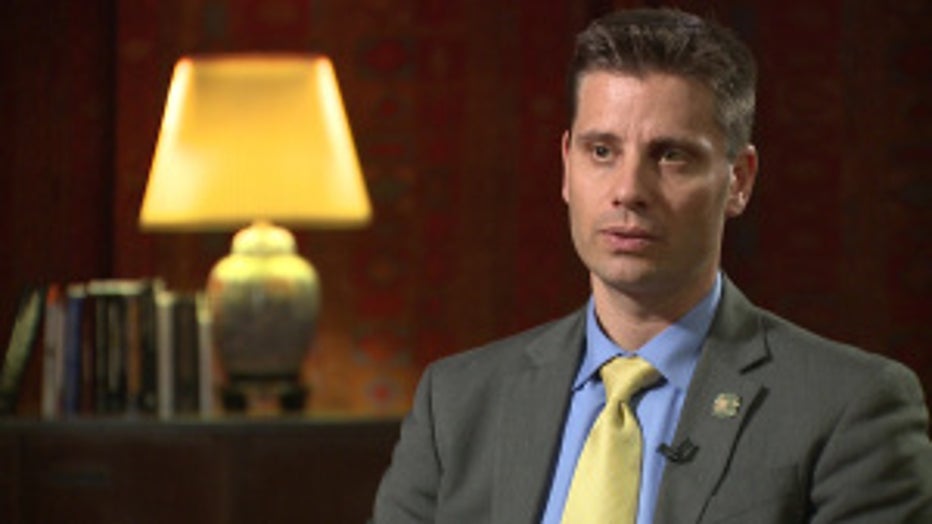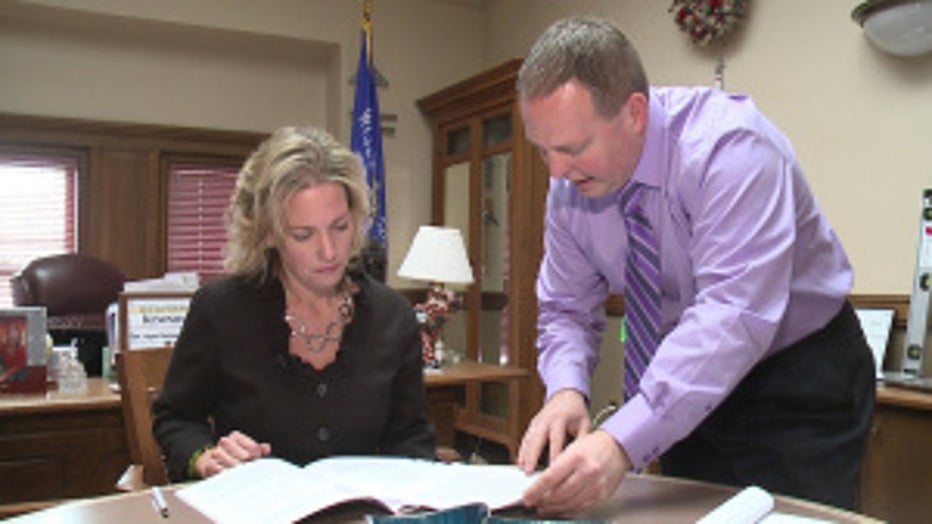Working the system: Bill would take "two strikes, you're out" approach to unemployment fraud
MILWAUKEE (WITI) -- The unemployment insurance fund is supposed to be a safety net for people who want to work, but can't find a job. But a FOX6 investigation finds that many of the people defrauding the unemployment system actually have jobs. They just claim they don't, so they keep collecting benefits. In other words, they are literally working the system.
In order to keep a roof over his own head, Nick Brzezinski repairs and installs them for others. For more than a dozen years, he's been a roofer.

Nick Brzezinski claimed thousands of dollars in unemployment compensation while working as a roofer.
But in 2010, he decided to beef up his paycheck by claiming he was out of work.
For 28 straight weeks, he filed claims that he performed no work and earned no wages. This, while he was working for a roofing company the whole time.
He even groused about the long hours on Facebook.
By the time the state caught on, Brzezinski had collected more than $10,000 in fraudulent benefits.
For that, he was convicted of a low-level misdemeanor, and he didn't even go to jail.
"Why would I stop doing it if I can go in and get a little slap on the hand?" Rep. Chris Kapenga (R-Delafied) said.
It's the kind of thing that could send a guy like Rep. Kapenga, well...through the roof! That's why he says it's time to get tough on unemployment cheats.

State Rep. Chris Kapenga wants to make changes in state law and add stronger penalties for those convicted of unemployment fraud.
"We're saying, 'hey, let's actually put something in place with teeth in it,'" Rep. Kapenga said.
Just weeks before Brzezinski started cheating the system out of $10,000, the state issued a warrant against him for $3,000 from an earlier case, for which he was never charged.
In other words, it appears Brzezinski may be a repeat offender. And if so, he's far from alone.
"It's frustrating to me as a legislator that this many people are taking advantage of the system," Rep. Samantha Kerkman (R-Salem) said.
Last year, Rep. Kerkman requested an audit of the unemployment insurance program. It found that over a three-year period, more than $86 million in unemployment benefits were paid to people who intentionally misled the government.

Rep. Kirkman and Bryan Polcyn go over the results of state audit for unemployment fraud.
"It's just a huge amount of money," Rep. Kerkman said.
The state Department of Workforce Development logged more than 64,000 fraudulent claims in those three years...bogus claims made by roughly 44,000 different people.
"Obviously some people are doing it more than once," Rep. Kerkman said.
Now, Rep. Kerkman, Rep. Kapenga and more than two dozen other state lawmakers-- all Republicans-- have signed onto a bill that would ban repeat offenders from collecting unemployment for seven years.
"When you talk seven years, that's gonna perk people up," Rep. Kapenga said.
They refer to it as a "two strikes and you're out" approach.
"This saying if you go out and you willingly commit fraud and you commit it again, we're going to do something about it," Rep. Kapenga said.
In addition, Governor Scott Walker's budget calls for increasing the penalties for unemployment fraud from a misdemeanor to a felony when the total theft is more than $2,500.
But all this attention on fraud is drawing fire from Walker's political adversaries.
"The demonizing that I feel is happening in this case is very, very concerning to me," Rep. Melissa Sargent (D-Madison) said.
When legislators met last month to discuss the state audit, emotions were high.
"'I find it profoundly unconscionable that anybody in any circumstance would try to justify what is tantamount to stealing," Rep. John Macco (R-Green Bay) said.
"I think it is uncalled for for a colleague of mine to say that some of us are justifying fraud," Rep. Terese Berceau (D-Madison) said.
Rep. Sargent said the biggest problem isn't fraud. It's how many people still don't have a job.
"They've lost all hope. And we have an awful lot of people in that case in Wisconsin," Rep. Sargent said.
Ironically, most of the people defrauding unemployment already have a job. And Joe Handrick with the Wisconsin Department of Workforce Development says what they're doing is stealing.
"They are not only stealing from the employers who pay that money in, but they are also harming the other employees in the state of Wisconsin who need that system and who are not defrauding the system," Handrick said.
So why don't more unemployment cheats go to jail?
While the state says more than 44,000 people defrauded the program over a three-year period, FOX6's investigation finds just 93 of them were referred for criminal charges.
"The district attorneys around the state have been saying 'we just don't have the funding to go after this stuff,'" Kapenga said.
Last year, the state referred 19 cases to district attorneys around the state. Only two resulted in criminal charges.
"And that's why we're hopeful that the penalties in the state budget will, a) provide more of a deterrent to fraud and, b) provide more of an incentive to district attorneys to want to take these cases up," Handrick said.
Remember Nick Brzezinski?
Just 10 months after he was sentenced to probation for bilking $10,000 from the unemployment system, he was arrested for stealing air conditioner parts from people's homes.

Brzezinski still owes thousands to the state for unemployment fraud.
For that, he was sentenced to nine months in jail -- nine more months than he got for ripping off taxpayers.
"If you break the law, there has to be consequence to it. We're a nation of laws. If you don't hold them accountable to it, then what good is the law?" Rep. Kapenga said.
Nicholas Brzezinski has paid back the $3,000 judgment from early in 2010. But according to court records, he still owes more than $11,000 for defrauding unemployment later in that same year.
Brzezinski did not respond to requests for an interview.
Meanwhile, the Department of Workforce Development says that, while most cases do not result in criminal charges, they are aggressive about pursuing repayment through things like intercepted tax returns, wage garnishment and other administrative means.
But it takes time.
They hope to recover as much as 78% of the fraudulent benefits paid out last year over the next 10 years.

